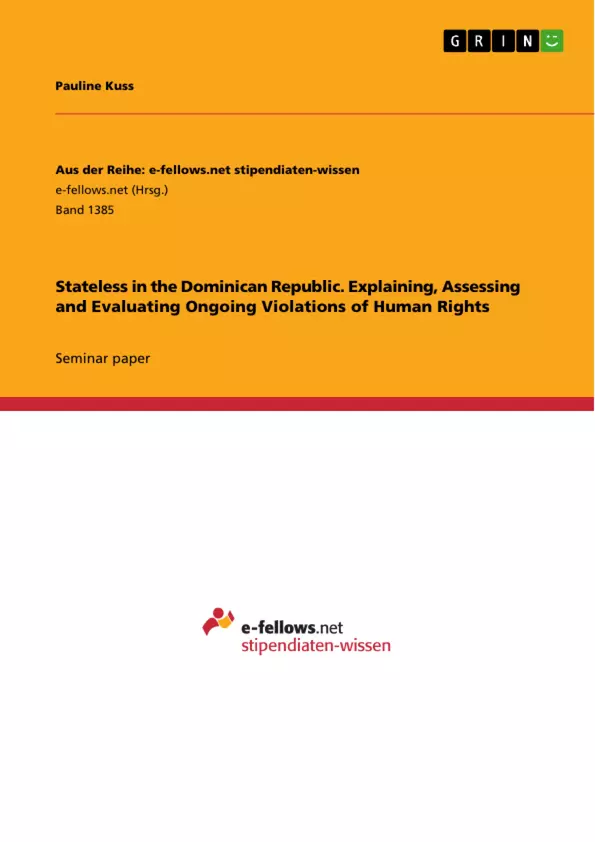Nationality can be seen as the rights to have rights and is protected by the Universal Declaration of Human Rights. However do various scenarios exist which might leave a person stateless. Being without a nationality comes with an increased vulnerability to violations of various personal rights. In the Dominican Republic thousands of Dominicans of Haitian descent were recently stripped off their nationality. This report will explain and assess the situation, shine a light on the struggles those individuals have to face and evaluate possible solutions that could be undertaken in order to address the problem.
In order to fully understand the nature of the statelessness issue of the Dominican Republic it is necessary to turn back to the year of 2004 in which the country started to gradually change its citizenship laws.
In the 1940s the need for cheap labour called many Haitians to the Dominican Republic where the immigrants enjoyed the benefits of a constitutional right to Dominican citizenship to everyone born inside the country irrespectively of the migration status of the parents. Originally this jus soli citizenship knew only two exceptions: Diplomats and children born to parents “in transit” – a term legally defined as “being within the country for ten days or less”.
But in 2004 the new Migration Law 285/04 de facto revoked the promise of birthright citizenship for Dominicans of Haitian descent by broaden the definition of “in transit” to henceforward also include nonresidents – including all migrant workers who had been working and living in the country for years, leaving them unable to register their Dominican‐born children as Dominican citizens henceforth.
Inhaltsverzeichnis (Table of Contents)
- INTRODUCTION
- HISTORICAL DEVELOPMENT
- ASSESSING THE CURRENT SITUATION
- INTERNATIONAL OBLIGATIONS
- CONCLUDING: RECOMMENDED ACTIONS
Zielsetzung und Themenschwerpunkte (Objectives and Key Themes)
This text examines the issue of statelessness in the Dominican Republic, focusing on the ongoing violations of human rights associated with this situation. The analysis encompasses the historical development of the issue, an assessment of the current situation, and a discussion of international obligations related to statelessness. The text ultimately seeks to recommend actions aimed at mitigating and eliminating the ongoing human rights violations stemming from statelessness.
- Historical development of Dominican citizenship laws
- The impact of recent legal changes on the status of Dominicans of Haitian descent
- The violation of human rights related to statelessness
- The role of international law in addressing statelessness
- Recommendations for addressing the statelessness issue in the Dominican Republic
Zusammenfassung der Kapitel (Chapter Summaries)
- Introduction: The introductory chapter establishes the significance of nationality as a fundamental human right and discusses the implications of statelessness, emphasizing the vulnerability to human rights violations experienced by individuals without a nationality.
- Historical Development: This chapter examines the evolution of Dominican citizenship laws, tracing the historical context leading to the current situation. It highlights the shift from a birthright citizenship policy to a system based on parental migration status, focusing on the impact of the 2004 Migration Law and the 2010 Constitution.
- Assessing the Current Situation: This chapter presents an in-depth analysis of the current situation regarding statelessness in the Dominican Republic. It explores the consequences of legal changes and administrative practices on individuals of Haitian descent, examining the difficulties they face in accessing essential documents and services.
Schlüsselwörter (Keywords)
The text focuses on themes of statelessness, human rights, citizenship laws, discrimination, Dominican Republic, Haitians, migration, birthright citizenship, international obligations, legal personhood, access to justice, and legal documentation.
- Citation du texte
- Pauline Kuss (Auteur), 2015, Stateless in the Dominican Republic. Explaining, Assessing and Evaluating Ongoing Violations of Human Rights, Munich, GRIN Verlag, https://www.grin.com/document/301253



